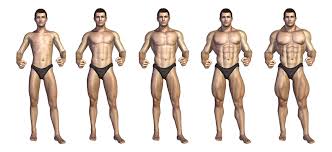 Hypertrophy is where your muscles get bigger. they get bigger because they heal and when they recover they come back stronger. Hypertrophy occurs when their is an increase in the size of the muscle fibres. Atrophy occurs when your muscles decrease and get smaller and that happens when you don't exercise enough.
Hypertrophy is where your muscles get bigger. they get bigger because they heal and when they recover they come back stronger. Hypertrophy occurs when their is an increase in the size of the muscle fibres. Atrophy occurs when your muscles decrease and get smaller and that happens when you don't exercise enough.
Increase in bone density This happens when you increase in calcium and having a healthy diet , then over time your bones will become stronger.
Decreased risk of osteoporosis Because of your bones have become stronger and denser our bones go stronger. but old people especially get osteoporosis because they do not do as much exercise so their bones and muscles will be weaker.

Improved posture It is good to have a good posture because when you get older it will be bad if you have a bad posture and it will help your health.
Increased number of Mitochondria is known as the powerhouse of the cells , by exercising you make more matrix the matrix is filled with water and proteins. In the mitochondria H2o Decrease in resting heart rate
When you exercise regular your heart rate will come down because its more efficient. professional athletes heart rate would be about 30 beats per minute.
Increase in heart size and strength
The heart is a muscle because it can be trained to become stronger and bigger. The more you exercise.
Increase in stroke volume
the amount of blood pump from the heart in 1 beat. The heart can pump more blood per beat so resting heart rate decreases (bradycanelia) heart become more efficient and does not need to beat as quickly to supply the body with oxygenated blood.
A common long term effect of exercise on the cardio-respiratory system is that, our heart works more efficiently. This happens because our heart needs to pump blood to the organs and muscles at work. There needs to be a certain amount so over a long period of time a marathon runners heart will work more efficiently to suit their sport.
Strength of diaphragm and intercostal muscles
After exercise, you’ll find your body experiences immediate and more gradual effects.
The minute you start training, you’ll notice more frequent muscle contraction, raised body temperature and pulse, and deeper breathing known as tidal volume. Longer-term effects occur as the body adapts to regular exercise, including your heart getting larger, bones becoming denser and the vital capacity of your breath deepening.
Increased number of alveoli
Small air sacs, called alveoli, inside your lungs that capture the oxygen you breathe in. Your lungs adapt to regular exercise by making more alveoli. More alveoli can supply more oxygen to working muscles and tissues throughout your body.
Increase in vital capacity
Exercise increases vital capacity because the lungs need more oxygen to supply the muscles with vital nutrients and the tougher the exercise the more nutrients needed. the lungs expand during this to account for the extra need then increases your vital capacity.
Increased in oxygen delivered
Oxygen in your body increases when you are exercising so you do not run out of breath and so then you can go on exercising for a lot longer and when your exercising your oxygen increases so you can breathe better.
No comments:
Post a Comment